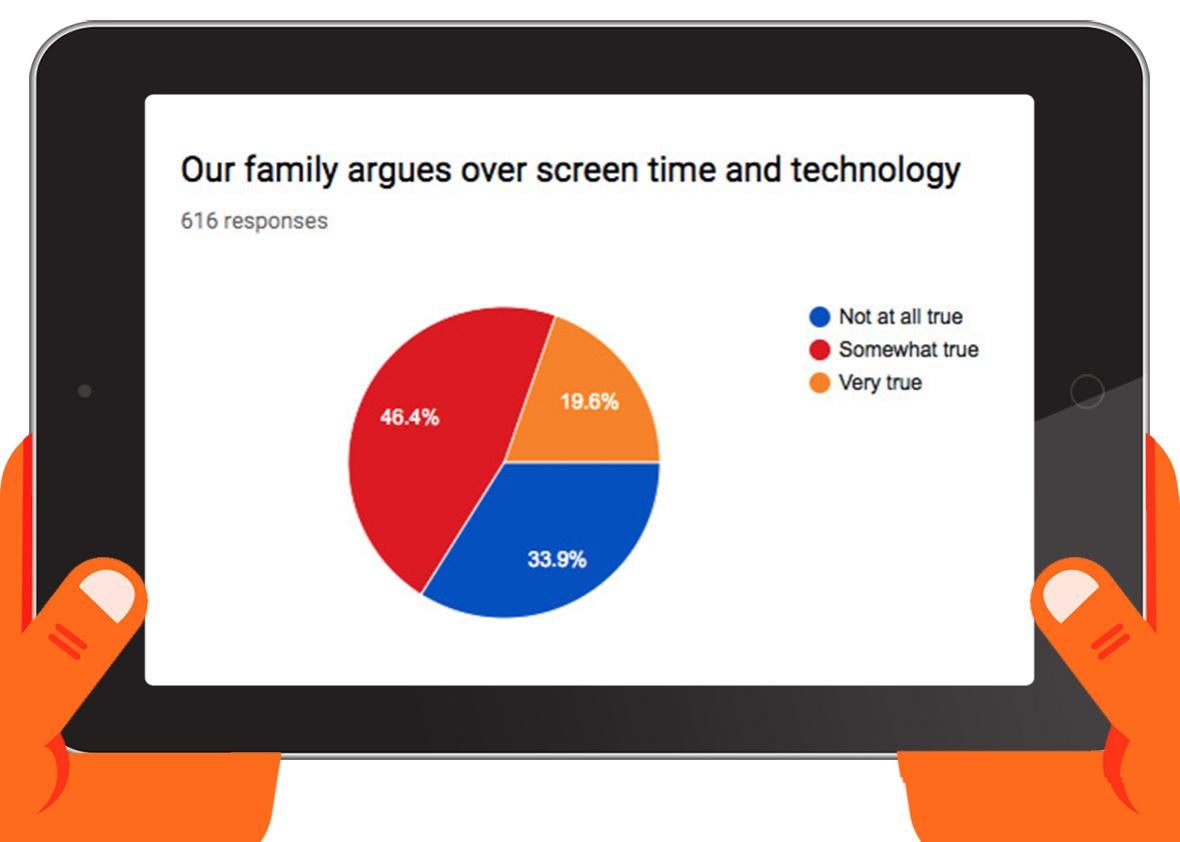For many parents, questions about children’s television begin and end with “Why do I have to argue about screen time so much with my kids?” On one hand, parents get worried by frightening headlines such as “Digital Heroin” (no, video games are nothing like heroin) and “Have Smartphones Destroyed a Generation?” (no, they have not). On the other hand, parents must contend with kids eager to consume limitless hours of screen time. To see how parents are balancing this, we surveyed Slate readers to see how they are managing screens in their households with kids between the ages of 4 and 13.
First, all surveys are only representative of the people who take them and Slate’s is no exception. We received a total of 502 usable responses to our survey. Our sample was mainly female, 87.8 percent. (In addition to all the other parenting work they do, apparently moms are the ones who are also willing to spend time on parenting surveys.) They also were mainly white (92.8 percent), highly educated (nearly 97 percent reported college degrees, with 41.4 percent reporting master’s degrees and 24.9 percent doctorates) and affluent (78.1 percent reported family incomes of more than $100,000).
Parents’ attitudes toward screens varied quite a bit, and parents reported seeing both value and concern in screen usage. It seems that the violent video game debate is waning as only 11.4 percent of parents were very concerned about video game violence causing societal violence. (Our sample were definitely not gamers, by and large. A full 91.4 percent reported playing exactly 0 hours of video games on a typical day.) This lack of concern corresponds to recent surveys of scholars and clinicians who also seem skeptical of video game violence effects. And with good reason, as evidence never materialized to link games with violence. (Even the 2012 Sandy Hook shooter turned out to mainly play the nonviolent game Dance, Dance Revolution.)
By contrast, parents do worry a lot about kids getting addicted to screens. Just about 90 percent of parents worried about this at least somewhat, which may be due to the recent spate of scary headlines on the topic. Although the American Psychiatric Association has been considering including a diagnostic category for internet gaming addiction, the topic remains controversial among scholars in the field.
Attitudes toward screens aren’t random. Women in our sample held slightly more negative attitudes toward screens than men, although the difference was quite small. By contrast, and one of the findings we find most interesting (and consistent with the surveys of scholars and clinicians mentioned above), is that parents who hold more hostile attitudes toward youth also tend to hold more negative attitudes toward screens. Curiously, dislike of kids and dislike of screens are highly predictive of each other. Kids today with their music and their hair and their iPhones!
Punishing kids for misbehavior by taking screens away is a common practice, with 79.9 percent of parents reporting doing this at least sometimes. Parents also aren’t terribly collaborative with their kids, with only 25.9 percent reporting that they work with their kids to develop screen use limits. Then again, some parents eschew limits altogether; 15.9 percent of parents report instituting no screen limits on their children on weekdays, and 22.1 percent on weekends. Perhaps that makes sense, as it seems those screen limits don’t exactly work; on average, parents admit that their children use their screens for 65 more minutes per weekday than they are actually supposed to.
With all these concerns about screens, parents are leading by example, right? Nope. Parents were wedded to their smartphones, spending an average of 3.29 hours on them a day; on average, parents only allowed their kids an average of 15 minutes of phone usage on weekdays, or 30 minutes on weekends. Parents report using screens of all kinds for an average of 6.12 hours on a typical day. That compares to 2.27 hours for their kids on weekdays and 4.94 hours for their kids on weekends (these differences are statistically significant). In fairness to parents, this is probably because kids in the sample were between the ages of 4 and 13, and screen time correlates highly with age. Youth over the age of 13 typically consume screens about as much as adults do, according to other studies. Some of the comments made by parent respondents suggest parents often gradually give up enforcing screen limits over time.
The best news for parents is that screen time, in and of itself, isn’t the best predictor of child behavioral outcomes. So, no, all that smartphone use probably isn’t turning your kid’s brain to jam. How kids (and adults) use screens, though, can be important. For instance, using social media to compare oneself negatively with others is associated with depression, even if social media use overall is not. Becoming involved and informed about our children’s screen use is probably one of the best things we can do to guide them through their development in the use of technology. The good news here is that fully 95 parents of parents report using screens alongside their children.
We thank the parents who participated in this survey. Full graphic results can be found here.
